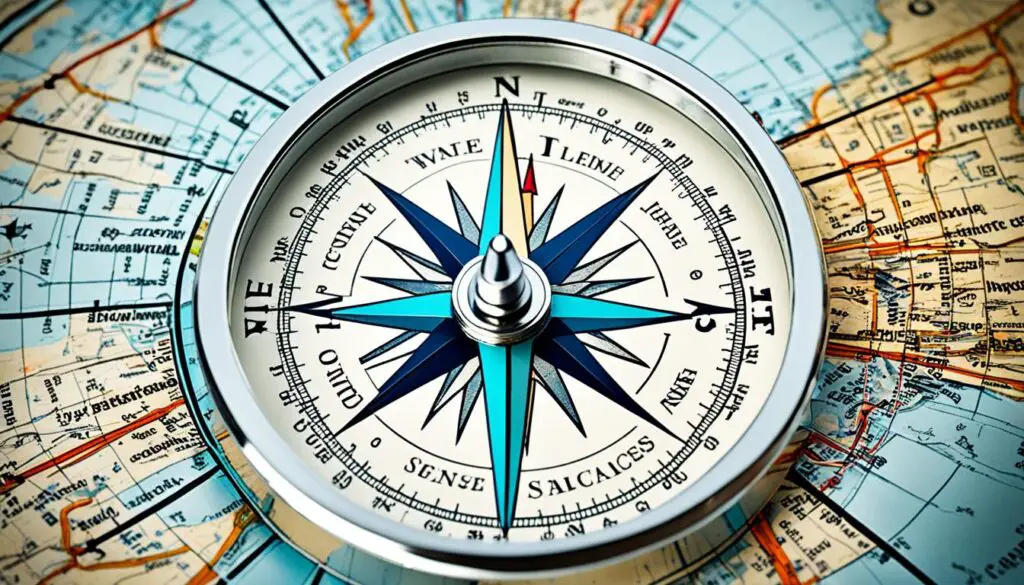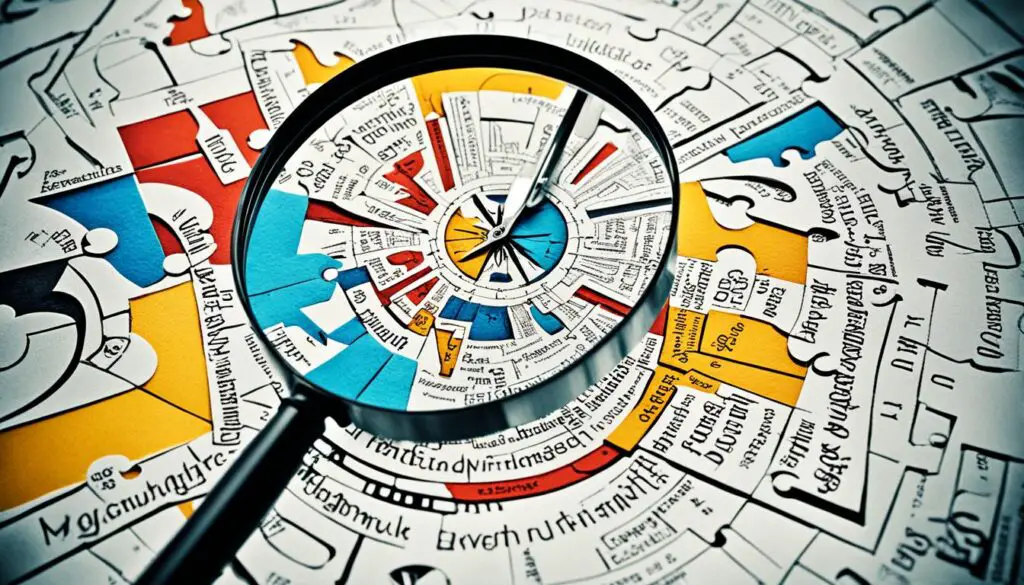In a world filled with misinformation and manipulation, the ability to discern truth from deception is more important than ever. With the rise of fake news, deepfakes, and calculated propaganda, it has become increasingly challenging to navigate the abundance of information and make informed decisions.
In this article, we will explore the concept of discernment in the midst of deception and empower you with the tools and techniques needed to unravel truth from falsehood. Together, we will delve into the nature of deception, develop discernment skills, and uncover strategies for detecting and evaluating information effectively.
No longer can we blindly accept everything we see or hear. It is crucial to cultivate a keen sense of discernment and critical thinking to protect ourselves and make informed choices. Are you ready to embark on this journey of truth-seeking and develop your discernment abilities?
Key Takeaways:
- Discernment is essential in navigating truth in a world filled with deception.
- Understanding the tactics and nature of deception can help differentiate between truth and falsehood.
- Developing discernment skills requires self-awareness and critical thinking.
- Techniques such as analyzing body language and verbal cues can aid in detecting deception.
- Reliable sources, critical analysis, and intuition play key roles in the discernment process.
Understanding Deception
Deception is a pervasive force that can cloud our perception and lead us astray from the truth. In order to navigate the complexities of the world we live in, it is crucial to develop the keen ability to discern between deception and truth. By understanding the nature of deception, we can equip ourselves with the necessary tools to uncover hidden agendas and manipulative tactics.
Deception can take many forms, ranging from subtle lies to elaborate schemes designed to deceive and exploit. Recognizing deception requires a heightened sense of awareness and the ability to detect the subtle cues that betray the true intentions behind words and actions. It involves analyzing not only what is being said, but also observing body language, vocal tone, and other behavioral indicators that may reveal inconsistencies.
One common tactic used in deception is the manipulation of facts or information. Deceptive individuals may selectively present information or distort the truth to serve their own agenda. By carefully examining the evidence, questioning assumptions, and seeking multiple perspectives, we can discern the truth from a web of deceit.
Another deceptive strategy is the use of emotional manipulation. Skilled manipulators may exploit our vulnerabilities, playing on our desires, fears, or insecurities to control and influence our beliefs and actions. By cultivating self-awareness and emotional intelligence, we can become more resistant to such manipulation, making it easier to discern between genuine emotions and calculated ploys.
Recognizing deception is an essential skill in today’s world, where misinformation and dishonesty can spread rapidly through various channels. It empowers us to make informed decisions, protect ourselves from manipulation, and contribute to a more honest and transparent society.
To illustrate key points, let’s consider an example. Imagine a political candidate making grand promises during a campaign, but their past actions and behavior suggest a different agenda. By looking beyond their words and critically analyzing their track record, we can discern whether their intentions align with their rhetoric or if deception is at play.
In the next section, we will dive deeper into the development of discernment skills. By honing our ability to discern truth from deception, we can navigate the complexities of our world with clarity and confidence.
Developing Discernment Skills
Developing discernment skills is essential in navigating the complexities of truth and deception. To cultivate discernment, it requires a combination of self-awareness and critical thinking. By honing these skills, you can empower yourself to uncover the truth in any situation.
One powerful technique for developing discernment is introspection. Take a moment to reflect on your own biases and preconceptions. By understanding your own perspectives, you can better recognize when they might cloud your judgment. This self-awareness allows you to approach information with impartiality and open-mindedness.
Another effective method is to actively engage in critical thinking. Challenge the ideas presented to you and question their validity. Look for inconsistencies, logical fallacies, and hidden agendas. By analyzing information critically, you can separate fact from fiction and make well-informed decisions.
Practical Exercises for Developing Discernment

There are several practical exercises you can incorporate into your daily routine to further develop your discernment skills:
- Journaling: Dedicate a few minutes each day to journal your thoughts, observations, and intuitions. This practice enhances self-reflection and helps refine your discernment abilities.
- Fact-checking: Whenever you come across information that seems questionable, fact-check it. Verify the sources, cross-reference the data, and seek reputable evidence.
- Engaging in debates: Participate in thoughtful debates and discussions that challenge your viewpoints. This allows you to see different perspectives and strengthens your critical thinking skills.
- Seeking diverse opinions: Surround yourself with a diverse range of people and actively seek out their opinions. This exposes you to varying viewpoints and helps you develop a more comprehensive understanding of complex issues.
- Practicing mindfulness: Cultivate mindfulness through practices like meditation or deep breathing exercises. This enables you to tune in to your intuition and strengthen your ability to make intuitive decisions.
By incorporating these exercises into your daily life, you can gradually enhance your discernment skills. Remember, developing discernment is an ongoing process that requires dedication and practice. With time and effort, you will become adept at distinguishing truth from deception, ultimately empowering yourself with invaluable discernment skills.
Techniques for Detecting Deception
In a world where deception is pervasive, it is essential to equip ourselves with the skills to detect and uncover hidden truths. This section explores various techniques that can aid in the detection of deception, allowing us to navigate truth with discernment.
Body Language Cues: One of the most powerful indicators of deception lies in nonverbal communication. Pay close attention to microexpressions, changes in posture, and inconsistent gestures. These subtle cues can reveal underlying emotions and discrepancies between words and actions.
Verbal Indicators: Words hold significant clues to spot deception. Listen for inconsistencies, such as contradictory statements, overly elaborate explanations, or an excessive use of qualifiers like “probably” or “maybe.” Shifts in tone, pitch, or speech rate can also indicate discomfort or nervousness.
Behavioral Clues
Behavior often provides valuable insights into deception. Look for signs of stress or discomfort, such as fidgeting, avoiding eye contact, defensive gestures, or excessive sweating. Sudden changes in behavior, speech patterns, or expression can also suggest attempts to conceal the truth.
When applying these deception detection techniques in real-life situations, it is crucial to exercise discernment and consider the context. Detecting deception requires a delicate balance between observation and interpretation, as well as an understanding of individual differences.
Tools for Discernment
As we navigate the complexities of truth amidst deception, equipping ourselves with discernment tools becomes crucial. These tools act as guiding compasses, enabling us to sift through information with clarity and confidence. When it comes to discernment, the old adage “knowledge is power” holds true.
Reliable sources play a pivotal role in our quest for truth. Consulting trusted references and established institutions can help us uncover accurate information. Additionally, critical analysis serves as an indispensable tool for discernment. By dissecting and evaluating facts and evidence, we can separate the wheat from the chaff.
Fact-checking is another valuable tool at our disposal. Verifying claims and cross-referencing information safeguards us against falling prey to false narratives. Remember, discernment requires us to challenge assumptions and question the authenticity of what we encounter.

Intuition and gut feelings deserve a place in the discernment toolkit as well. These intuitive prompts can serve as red flags or nudges in the right direction, guiding us towards the truth. Paying attention to our internal compass can help us navigate through the labyrinth of deception.
By embracing these discernment tools, we empower ourselves to unravel truth from the entanglements of deception. In the next section, we will explore a range of strategies that complement these tools, enhancing our ability to discern with astuteness and clarity.
Strategies for Discernment
In a world filled with deception, developing effective strategies for discernment is essential to navigate the truth. By employing these strategies, you can enhance your ability to distinguish fact from fiction and make informed decisions. Here are some powerful strategies to sharpen your discernment skills:
1. Asking Thoughtful Questions
Asking thoughtful questions is a key strategy for discernment. When encountering information or claims, take a moment to reflect and question its validity. Consider the source, evidence, and motives behind the information. By asking critical questions, you engage your intellect and uncover deeper insights.
2. Seeking Multiple Perspectives
Expanding your understanding through multiple perspectives is crucial for discernment. Avoid limiting yourself to a single viewpoint and actively seek out diverse opinions and sources of information. By examining different angles, you gain a broader understanding of the subject matter and can discern hidden biases or agendas.
3. Staying Open-Minded
An open mind is a powerful tool for discernment. Approach new information with curiosity and willingness to challenge your own beliefs. Be receptive to new ideas and be open to revising your opinions based on new evidence. Staying open-minded allows you to consider alternative viewpoints objectively and make sound judgments.
4. Avoiding Confirmation Bias
Avoiding confirmation bias is crucial in the discernment process. Confirmation bias is the tendency to interpret information in a way that confirms our existing beliefs. Be aware of this cognitive bias and consciously seek out contradictory evidence or perspectives. By actively challenging confirmation bias, you can overcome preconceived notions and make more accurate assessments.
5. Evaluating Information Objectively
Evaluating information objectively is fundamental to discernment. Develop critical thinking skills to assess the credibility, reliability, and relevance of the information you encounter. Examine the source, fact-check claims, and consider the supporting evidence. By evaluating information objectively, you can separate truth from deception and make well-informed decisions.
By incorporating these strategies into your discernment toolkit, you empower yourself to navigate truth effectively and navigate through the sea of deception. Remember, discernment is a skill that can be cultivated and honed over time. Embrace these strategies and make discernment an integral part of your decision-making process.
The Power of Keen Insight
To effectively navigate truth in a world riddled with deception, the power of keen insight becomes an invaluable tool. Keen insight is the culmination of observation, analysis, and intuition, working harmoniously to reveal the hidden layers within a situation or information.
Observation is the first step to sharpening your insight. By paying attention to subtle cues and details, you can uncover the underlying motivations and intentions behind a person’s words or actions. It is through keen observation that discernment begins to take shape.
Analysis is the next crucial aspect of developing discernment skills. It involves taking a step back, critically examining the information at hand, and challenging its validity. By applying discernment techniques such as logical reasoning and critical thinking, you can filter out biases and uncover the truth.
Intuition, the third component of keen insight, taps into your inner wisdom and gut feelings. It is an innate sense that goes beyond logical reasoning and enhances your discernment abilities. Trusting your intuition can guide you towards making informed decisions that align with your values and principles.
To sharpen your insight, it is essential to engage all three components – observation, analysis, and intuition – in a balanced manner. Embrace the power of keen insight, and watch as the world around you becomes clearer, revealing the truth that lies beneath the surface.

Cultivating Discernment in Daily Life
Developing discernment is a lifelong journey that extends beyond the confines of specific situations or contexts. To truly navigate truth in the midst of deception, it is essential to cultivate discernment as an integral part of our daily lives.
Incorporating discernment into various aspects of our lives empowers us to make informed decisions and build meaningful connections. Whether it’s in relationships, media consumption, or the decision-making process, practicing discernment helps us see through illusions and unravel the hidden truths.
One way to cultivate discernment in relationships is by actively listening and observing. By paying attention to non-verbal cues, subtle changes in behavior, and inconsistencies in words and actions, we can gain deeper insight into the authenticity of others.
Similarly, in the era of information overload, cultivating discernment in media consumption is crucial. It involves critically evaluating sources, fact-checking information, and seeking diverse perspectives. By doing so, we can separate reliable and accurate information from misleading narratives.
In the realm of decision-making, incorporating discernment means considering multiple factors, weighing pros and cons, and consulting our intuition. It requires us to go beyond surface-level analysis and dig deeper into the underlying motives and agendas involved. This process helps us make choices that align with our values and priorities.
Cultivating Discernment: A Lifelong Skill
Cultivating discernment is not an isolated task, but a continual commitment to personal growth. It requires self-awareness, an open mind, and a willingness to explore new perspectives. Developing discernment allows us to navigate the complexity of the world with clarity and wisdom.
As we embark on this journey, it’s important to remember that cultivating discernment is not about being judgmental or overly skeptical. It’s about developing the ability to critically evaluate information and make decisions based on thoughtful analysis and aligned values.
By practicing discernment regularly, we develop a sharpened sense of intuition, enabling us to perceive subtle nuances and make well-informed choices. Discernment enhances our ability to see beyond the surface, uncover hidden truths, and navigate the labyrinth of deception.
Cultivating discernment is an ongoing process that takes time and effort. With each step, we strengthen our discernment muscles and equip ourselves with the skills to navigate a world filled with deception. Let discernment be our compass, guiding us on the path to truth and authenticity.
Conclusion
Discernment in the midst of deception is an invaluable skill that can empower individuals to navigate truth in an increasingly complex world. Throughout this article, we have explored the nature of deception, developed discernment skills, and discovered techniques for detecting and uncovering hidden truths. By cultivating discernment, we can make better decisions, avoid falling prey to manipulative tactics, and maintain our integrity.
Key takeaways from this article include the importance of self-awareness and critical thinking in developing discernment skills. By actively engaging in practices such as observing body language cues, analyzing verbal indicators, and seeking multiple perspectives, we can enhance our ability to discern between deception and truth. Additionally, relying on reliable sources, conducting fact-checking, and trusting our intuition can serve as valuable tools in the discernment process.
As we move forward, let us remember that discernment is not a one-time achievement but an ongoing journey. By applying the strategies discussed in this article and integrating discernment into our daily lives, we can navigate truth more effectively and protect ourselves from the dangers of deception. With discernment as our guide, we can make informed decisions, cultivate meaningful relationships, and contribute to a more truthful and authentic world.





